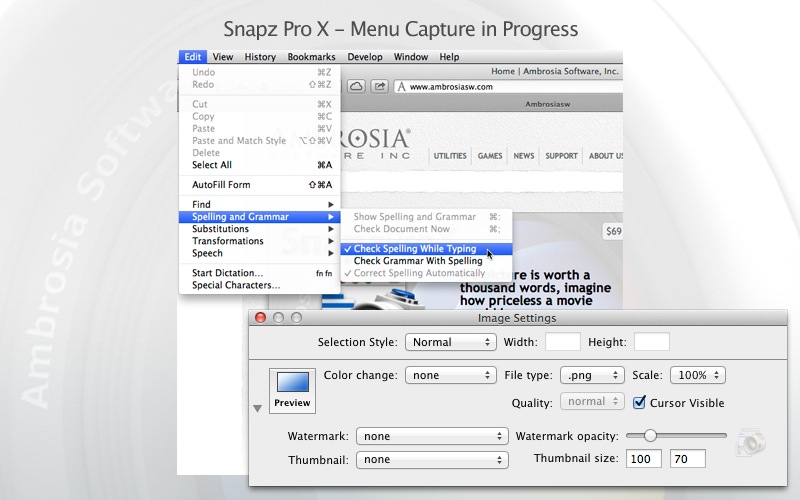


The company's software was released on the honor system with only a short reminder that you had used the unregistered software for "x" amount of time, creating what is commonly called nagware. One of Ambrosia's founding mantras was that shareware software should not be distributed as crippleware.
#Ambrosia snapz pro x mac os#
Big Cheese Key X - Mac OS X-compatible version of original.
#Ambrosia snapz pro x mac os x#

Big Cheese Key - FKey to mask screen image from boss.Productivity software Īmbrosia Software's utilities, in order of release: Escape Velocity Nova - Universal Binary releaseĪmbrosia, in conjunction with DG Associates, has also released the Escape Velocity Nova Card Game.Apeiron X - Mac OS X port of the original, with enhanced graphics.Bubble Trouble X - Mac OS X port of original, with minor gameplay changes.Products Games Īmbrosia Software's games, in order of release: In late 2018, the company's last remaining employee announced that Ambrosia was officially shutting down operations. Nearly all of the company's ten employees were laid off in 2013, but Welch denied rumors of the company closing. In 1999, Cameron Crotty of Macworld wrote that "No other company has gotten so much mileage out of renovating mid-1980s arcade hits." This initial success led Ambrosia to release several more action games, including Apeiron (a remake of Centipede), Swoop (a clone of Galaxian), and Barrack (a clone of JezzBall). Maelstrom won a number of software awards. Ambrosia Software was incorporated August 18, 1993, by Andrew Welch after he graduated from the Rochester Institute of Technology in 1992. It used raster graphics similar in style to Atari's later Blasteroids (1987) and the Atari ST game Megaroids (1988). The first game distributed under the Ambrosia Software name was Maelstrom, a 1992 remake of the 1979 Asteroids arcade video game.


 0 kommentar(er)
0 kommentar(er)
